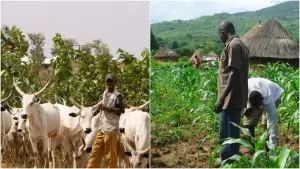The Tiv Area Traditional Council has ordered all herders to vacate Tiv lands in Benue State by the end of May 2025, following an emergency meeting held at the palace of the Tor Tiv in Gboko.
The resolution, which emerged from a gathering presided over by His Royal Majesty, Orcivirigh Professor James Ortese Iorzua Ayatse, was prompted by escalating concerns over persistent attacks on farmers and growing food insecurity in the region.
According to a communiqué signed by the council's secretary, Shinyi Tyozua, the traditional rulers expressed grave concern regarding the continued attacks and killings of farmers by armed herders across multiple Local Government Areas including Kwande, Katsina-Ala, Logo, Ukum, Guma, Makurdi, Gwer-West, Gwer-East, and Buruku.
"These unprovoked attacks have disrupted farming activities at a critical time," the council warned in the statement. "If the trend continues, it could lead to mass hunger and exacerbate the ongoing national food crisis."
The council has called on all herders to immediately begin the process of withdrawal from Tiv lands, emphasizing that the safety of farmers and the success of the 2025 planting season must be prioritized to avert potential food shortages.
In addition to the evacuation order, the traditional leaders have appealed to both traditional and political authorities in the affected areas to engage in peaceful dialogue with herders to ensure a non-violent relocation process.
The council also requested the Benue State government to "create the enabling environment to allow herders' peaceful exit of farmlands in Tiv Kingdom to facilitate resumption of farming activities."
This directive comes amid increasing tensions between farming communities and herders in Benue State, which has been a flashpoint for farmer-herder conflicts over the years. The situation has significantly impacted agricultural productivity in a state known as the "food basket of the nation."
The council's decision reflects growing concerns about national food security, as disruptions to farming activities in major agricultural regions like Benue could have far-reaching implications for food supply across Nigeria.
As the deadline approaches, stakeholders will be watching closely to see how the situation unfolds and whether the directive will lead to peaceful resolution or further complications in the long-standing farmer-herder tensions in the region.













